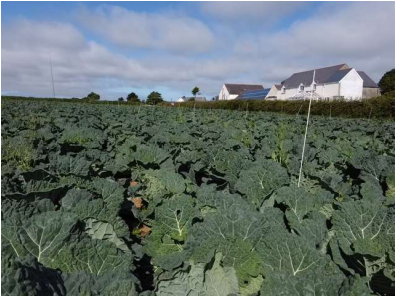Funded through Innovate UK, POSTCOVA was a 12-month research programme running through to Autumn 2021.
POSTCOVA tackled major reductions in use of Nitrogen fertiliser – besides bovine methane emissions the largest source of CO2 equivalent emissions in agriculture through Nitrous Oxide ( N2O ) emissions and huge energy production costs of Nitrogen fertilisers.
New formulations
ERL developed an entirely new formulation of Nitrogen fertiliser (now named FOLIA-N) based on the latest in-house research that is applied directly to crop foliage and never applied to soil.
Unlike other Nitrogen products, FOLIA-N can be applied at high dose rates to foliage without causing any crop damage, allowing over 90% take-up efficiency and eliminating Nitrous Oxide emissions from added crop fertiliser almost entirely.
The objective
POSTCOVA project was to demonstrate that using FOLIA-N (along with supportive biostimulants and microbes) the partners could cut overall applications by 30-50% or more and reduce GHG emissions by potentially 90% on a range of vegetable crops (leeks, cabbage, cauliflower, salad and maincrop potatoes).
The use of benign soil microbial mixtures and foliar applied naturally derived biostimulants improved uptake efficiency, crop growth and rooting while sequestering significantly more carbon directly into the soil.
Greenhouse gas emissions
Furthermore, through POSTCOVA, ERL developed and now has an International Patent Pending on a GHG emissions detector management device intended for use by farmers & advisors – something unavailable until now and a device that could be a game changer for environmental and emissions management.
POSTCOVA approach reduced overall inputs of both fertilisers and synthetic crop protection products, but also employed new precision tools (described above) to improve application timings, methods, and amounts.
These techniques and interventions led to reduced nitrogen losses and a significant reduction in associated emissions while improving soil quality and crop yields.
Preliminary POSTCOVA trials optimised the application of plant nutrients & biostimulants improving productivity, health and nutritional quality of key-cultivated vegetables in Wales (potatoes, leeks, cabbages, cauliflowers, Brussels sprouts and carrots).
Results
Results demonstrate that using this holistic approach can improve crop production by 5-20%, while simultaneously reducing direct nitrogen use by 30-60% and nitrous oxide emissions by 90%.
Foliar Nitrogen & Biostimulant programme vs. Conventional Summary
- Independent, commercially-driven field crop trials (Puffin Produce Ltd & Bangor University)
- Reduce Nitrogen fertiliser – reduce pollution, GHG emissions, costs
- OptiYield foliar Nitrogen (Folia-N) and Biostimulant programme vs. Conventional
- Better crop performance despite cutting Nitrogen rates by 50% or more

The POSTCOVA project was led by Emerald Research Ltd. (ERL) in close collaboration with the expertise and facilities provided by the BioComposites Centre, Bangor University and the active trials expertise and input from Puffin Produce Ltd. (PPL) in Pembrokeshire, the largest supplier of fresh produce in Wales, providing a wide variety of potatoes and seasonal vegetables to multiple major retailers and wholesalers. The outcomes of this research is transferable to the whole of the UK and beyond, providing the means for farmers and growers to both increase crop production and reduce costs and emissions.

